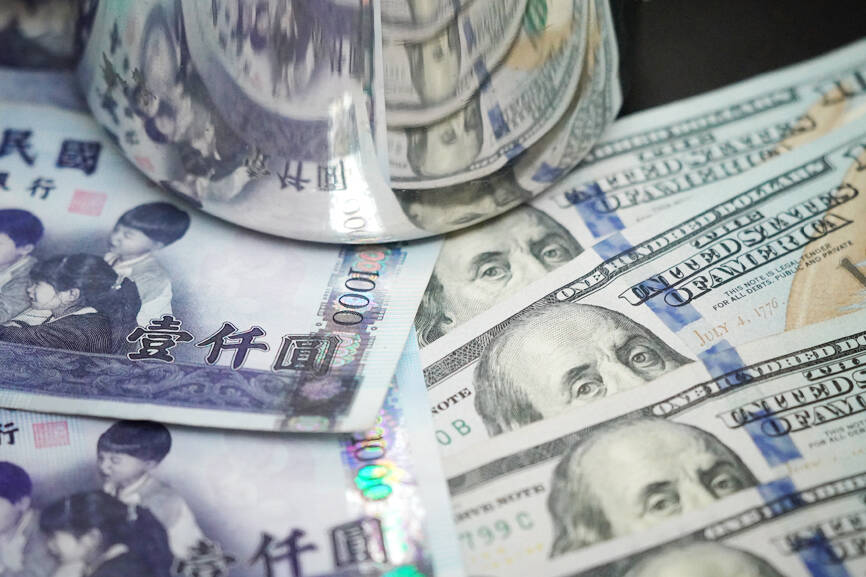Taiwan’s foreign exchange reserves last month declined by US$1.56 billion to US$571.74 billion, ending two months of gains, due to an outflow of foreign capital, the central bank said yesterday.
The retreat also had to do with the monetary policymaker’s intervention in the foreign exchange market, which was aimed at slowing the local currency’s depreciation against the US dollar, Department of Foreign Exchange Director-General Eugene Tsai (蔡炯民) told an online news conference.
The New Taiwan dollar lost 1.13 percent against the greenback as foreign portfolio managers wired cash dividends and capital gains abroad, Tsai said.

Photo: CNA
Foreign stock players collected US$4 billion to US$5 billion in cash dividends and an unspecified amount of capital gains from the local bourse, which repeatedly rallied to record highs in the first half of last month, he said.
Capital outflows totaled US$12 billion, Tsai added.
Major reserve currencies also devalued against the US dollar: the Euro dropped 1.21 percent, the Canadian dollar declined 0.9 percent and the Australian dollar decreased 1.96 percent, Tsai said.
Japan’s yen and China’s yuan bucked the downturn, advancing 4.76 percent and 0.68 percent respectively, Tsai said.
Taiwan ranked the world’s fifth largest holder of foreign reserves after China, Japan, Switzerland and India, he said.
The NT dollar’s momentum is likely shifting, as the US Federal Reserve (Fed) is widely expected to lower interest rates next month, after the US economy recently showed signs of weakness and inflation has become muted, Tsai said.
Moving forward, the Fed would assign more importance to economic health after the latest US employment data disappointed and corporate earnings produced mixed results, Tsai said, adding that a hard landing is unlikely for the US economy.
The US presidential election poses further uncertainty, he added.
The NT dollar yesterday rose 0.5 percent, or NT$0.178, against the greenback, although the TAIEX plunged by an unprecedented 8.35 percent, or 1,807.21 points, to 19,830.88.

Taiwan Semiconductor Manufacturing Co (TSMC, 台積電) yesterday said that its investment plan in Arizona is going according to schedule, following a local media report claiming that the company is planning to break ground on its third wafer fab in the US in June. In a statement, TSMC said it does not comment on market speculation, but that its investments in Arizona are proceeding well. TSMC is investing more than US$65 billion in Arizona to build three advanced wafer fabs. The first one has started production using the 4-nanometer (nm) process, while the second one would start mass production using the

A TAIWAN DEAL: TSMC is in early talks to fully operate Intel’s US semiconductor factories in a deal first raised by Trump officials, but Intel’s interest is uncertain Broadcom Inc has had informal talks with its advisers about making a bid for Intel Corp’s chip-design and marketing business, the Wall Street Journal reported, citing people familiar with the matter. Nothing has been submitted to Intel and Broadcom could decide not to pursue a deal, according to the Journal. Bloomberg News earlier reported that Taiwan Semiconductor Manufacturing Co (TSMC, 台積電) is in early talks for a controlling stake in Intel’s factories at the request of officials at US President Donald Trump’s administration, as the president looks to boost US manufacturing and maintain the country’s leadership in critical technologies. Trump officials raised the

‘SILVER LINING’: Although the news caused TSMC to fall on the local market, an analyst said that as tariffs are not set to go into effect until April, there is still time for negotiations US President Donald Trump on Tuesday said that he would likely impose tariffs on semiconductor, automobile and pharmaceutical imports of about 25 percent, with an announcement coming as soon as April 2 in a move that would represent a dramatic widening of the US leader’s trade war. “I probably will tell you that on April 2, but it’ll be in the neighborhood of 25 percent,” Trump told reporters at his Mar-a-Lago club when asked about his plan for auto tariffs. Asked about similar levies on pharmaceutical drugs and semiconductors, the president said that “it’ll be 25 percent and higher, and it’ll

CHIP BOOM: Revenue for the semiconductor industry is set to reach US$1 trillion by 2032, opening up opportunities for the chip pacakging and testing company, it said ASE Technology Holding Co (日月光投控), the world’s largest provider of outsourced semiconductor assembly and test (OSAT) services, yesterday launched a new advanced manufacturing facility in Penang, Malaysia, aiming to meet growing demand for emerging technologies such as generative artificial intelligence (AI) applications. The US$300 million facility is a critical step in expanding ASE’s global footprint, offering an alternative for customers from the US, Europe, Japan, South Korea and China to assemble and test chips outside of Taiwan amid efforts to diversify supply chains. The plant, the company’s fifth in Malaysia, is part of a strategic expansion plan that would more than triple